Adjustment of individual vitamins and minerals
According to the latest scientific findings, the minimum and maximum amounts of nutrients are even more in line with the nutritional needs of babies.
*prices incl. VAT plus shipping costs
Ready to ship today,
Delivery time appr. 1-4 days²

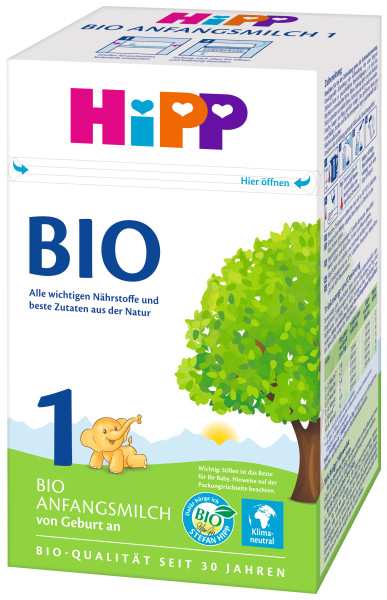
What are LCPs?
LCP stands for "Long-Chain Polyunsaturated Fatty Acids" and describes long-chain polyunsaturated fatty acids. Among other things, these are very important for the development of brain and nerve cells, as well as for the baby's ability to see. Examples of LCPs include docosahexaenoic acid (DHA) - an omega-3 fatty acid - and arachidonic acid (ARA) - an omega-6 fatty acid.
Because babies cannot yet produce enough LCPs themselves in the first months of life,LCPs arealready added to our infant formulas . Under the new EU Infant Formula Directive, the addition of DHA is now required by law.
Expert opinion favors the addition of both DHA and ARA to infant formulas. Otherwise, it has been proven that these fatty acids can deviate from those of breastfed infants, who are always supplied with DHA and ARA through their mother's milk. This is why we have been using the combination of DHA and ARA in our HiPP infant formula for years.
What is DHA?
DHA - the abbreviation stands for docosahexaenoic acid - is a long-chain, polyunsaturated omega-3 fatty acid.
Why is DHA important?
Omega-3 fatty acids contribute to the normal development of brain and nerve cells and vision. Omega-3 fatty acids are naturally present in breast milk. To ensure that non-breastfed infants also have an adequate supply of DHA, DHA is added to infant formula, e.g. in the form of fish oil.
What is ARA?
ARA - the abbreviation stands for arachidonic acid - is a long-chain, polyunsaturated omega-6 fatty acid. Omega-6 fatty acids are naturally present in breast milk. Their content is strongly dependent on the mother's diet. To ensure that non-breastfed infants are also adequately supplied with these vital fatty acids, ARA is added to infant formula, e.g. in the form of vegetable oils, e.g. from Mortierella Alpina.
According to the latest scientific findings, the minimum and maximum amounts of nutrients are even more in line with the nutritional needs of babies.
As before, our infant milk formula is adapted to the special nutritional needs of babies. So your child gets exactly what it needs for its development.
For 50 years, we have been putting all our care and experience into producing the best infant milk formula. So with our HiPP BIO and HiPP BIO COMBIOTIK® milk foods, you can rely on long-established concepts developed by nutritional experts based on breast milk - building on the latest findings in milk nutrition research and in the best HiPP organic quality.
Nothing will change with regard to our stage concept, product names or age recommendations.
 There is a simple recipe for healthy babies: BIO milk formula from HiPP. Made with valuable organic milk and strictly controlled organic ingredients.
There is a simple recipe for healthy babies: BIO milk formula from HiPP. Made with valuable organic milk and strictly controlled organic ingredients.
Awarded "recommendable" in the Greenpeace shopping guide "Food without genetic engineering".
As a pioneer in organic production, we have also relied on the best organic ingredients for milk formula for decades and are convinced that we can make an important contribution to healthy development in the period after breastfeeding with infant milk formula in organic quality.
are more strictly controlled than required by law. All HiPP milk foods are rigorously tested. Hipp go well beyond the strict requirements of the legislator for milk foods in the selection of raw materials and control more strictly than required by law. The strictest quality controls from the raw material to the end product guarantee the greatest possible safety for you and your baby.
Note:
The product is suitable for special feeding of infants from birth if they are not breastfed.
Important:
At this point, it is important to clearly state the superiority of breastfeeding in conjunction with the recommendation to use the product only on the advice of independent professionals in the field of medicine, nutrition or medicines or other persons responsible for infant care.
This product meets the strict Hipp organic requirements, which even exceeds the legal requirements of international organic farming regulations. A close-meshed control network ensures that many products undergo more than 260 checks before they are released for delivery. Internal control laboratories as well as external independent quality institutes are entrusted with the tests. "I vouch for it with my name" is something you've probably heard in advertising. It is a very special personal responsibility, which is made clear by the company owner Prof. Dr. Claus Hipp.
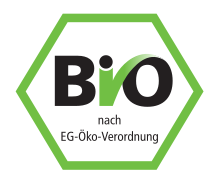 |  | 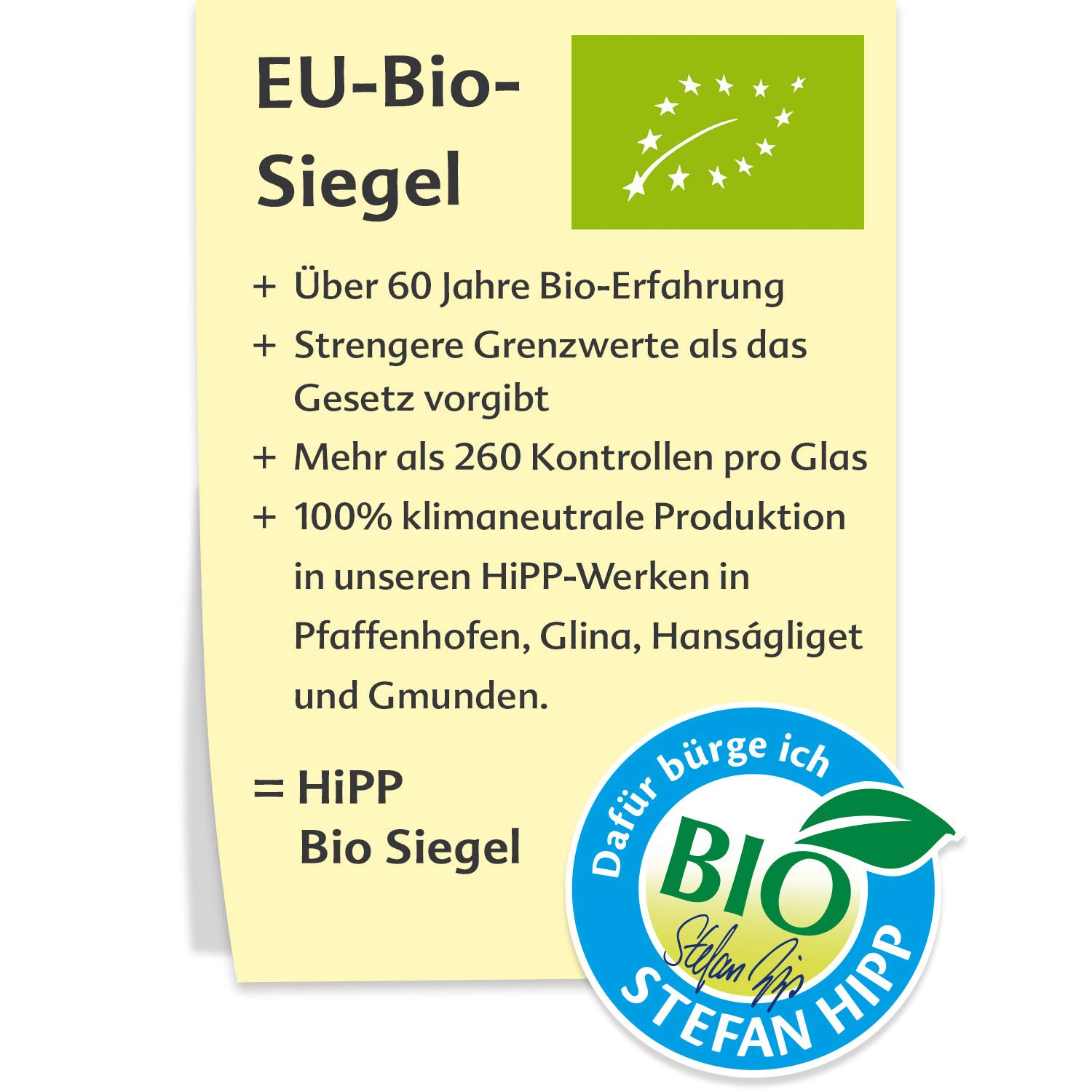 | 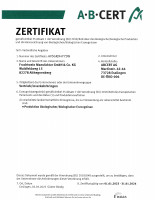 |
| National organic seal | EU organic seal | Hipp-Bio-Seal | Schafi-Shop certificate |
Schafi-Shop, a brand of Fruchtwein Manufaktur GmbH & Co. KG, is regularly certified as a trader according to the EU organic regulation by an independent control institute. Organic inspection body DE-ÖKO-006, registration number according to EC Organic Regulation No. 834/2007: DE-BY-006-50203-H. For more information, click on the certificate or here.
| Filling quantity (weight): | 600g |
| baby food: | biological, powdered formula |
| country of origin: | EU / non-EU Agriculture |
| milk-free products: | No |
| Products with organic ingredients: | yes |
| age group: | from birth |
| gluten-free products: | Yes |
| Shipping weight: | 0,67 kg |
| Manufacturer: | Hipp |
| Dimensions HxWxD (approx.): | 202x126x86 mm |
| Made in: | EU (Germany) |
| product group: | Baby Formula |
| brand: | Hipp |
| Manufacturer address: | Hipp GmbH & Co. Vertriebs KG, Georg-Hipp-Str. 7, 85276 Pfaffenhofen (Ilm), Deutschland |
Manufacturer contact: Hipp GmbH & Co. Vertrieb KG, 85276 Pfaffenhofen
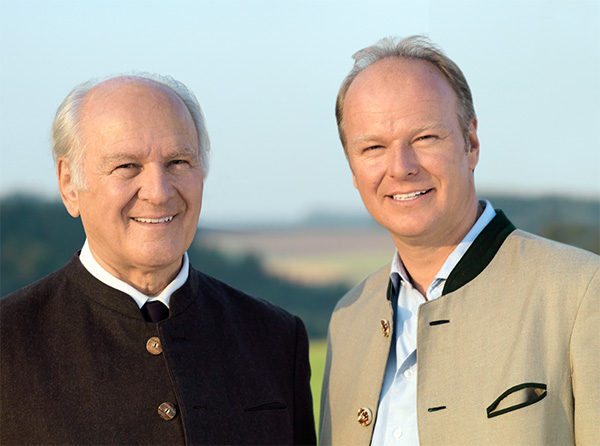
" Taking the baby into the limelight carries a great deal of responsibility, which is
why our organic products are of a very special quality and are GM-free according to the EU Organic Regulation. "
What began over 60 years ago with organic farming is practiced in all areas of the company: the careful use of the environment and natural resources, a respectful togetherness and the highest quality. All of these are requirements that HiPP has grown and that are closely associated with the name HiPP.
Sustainability as a corporate philosophy
Sustainability is the balanced balance between the three dimensions of ecology, economy and social issues. Sustainability is not a hot topic for HiPP. As a manufacturer of baby food, HiPP has special responsibility for future generations. HiPP has been committed to organic farming for 60 years and, as a pioneer, has shaped sustainable standards. Sustainability management keeps an eye on the company as a whole and the entire value chain. Long-term orientation of entrepreneurial activity, careful use of natural resources and social interaction are the key ethical principles followed by HiPP.
HiPP is "excellent"!
The involvement of HiPP has received many awards. The great trust of consumers and the public, which is documented in these recognitions, is both a great honor and a commitment for the baby food manufacturer. The company's claim is to continue meeting these expectations.
Since 2002, the Ökologia Prize has been awarded to companies or entrepreneurs who have committed themselves through particularly exemplary projects in favor of ecology and contributed to the realization of the desired ecological and social market economy. On October 19, 2017, Claus Hipp received the award from the Rhineland-Palatinate Minister of the Environment Ulrike Höfken in Mainz.
"From today's perspective, of course, many of what Claus Hipp did, of course, but 50 years ago, this was all new. In times of industrialization and chemical agriculture, Claus Hipp had already set a counter - trend here, created a different model of thinking and thus hit the nerve of the coming decades to this day ", said the Minister, handing the prize over in her function as" Ecologia Ambassador of the Ecology 2017 "together with Hans-Joachim Ritter. The Chairman of the Foundation for Ecology and Democracy said in his speech: "Claus Hipp is a pioneer of ecological awareness in agriculture and society, a shining example of an entrepreneurial personality,
previous awards:Focus on the human being -
social and social responsibility
For HiPP, social responsibility is the essential basis for successful entrepreneurial action. This is reflected not only in the sustainable measures of personnel management, but also distinguishes the diverse social commitment in solidarity with people in need: HiPP helps young families with multiple births and regularly donates for the non-profit organization "Münchener Tafel e. V. ". Also auxiliary transport of Caritas in crisis areas supports HiPP. For the exemplary assumption of social responsibility HiPP 2013 received the first prize of the German Federal Government for Corporate Social Responsibility (CSR).
Since 1999, the company has its own ethics charter based on responsibility to people, nature and the environment. Central concerns are fair competition and the respectful treatment of business partners, suppliers, customers and employees. HiPP recognizes that a perfect and harmonious alignment of our goals with our actions is a constant challenge. We want to face this and continuously improve ourselves in this process
As a family-friendly company, HiPP promotes the compatibility of family and work. Almost every department has different working models with flexible working hours, which give parents better career development opportunities. In Pfaffenhofen alone, 200 individual models and flextime variants without core time are used. The fact that the workforce feels comfortable is shown by the comparatively long periods of service.
The health and well-being of employees is the highest asset of a company. Those who feel comfortable feel more quality of life, are happier, more balanced and also more committed. Occupational health management is becoming more and more important as a component of HR, quality and sustainability management. Occupational pensions, high standards of occupational safety and health, action days for health, fitness and sports activities promote the well-being of our workforce. Organic food, regional food and allergen management round out the commitment in the company restaurant. So vegetarian and vegan dishes are also firmly integrated into the diet.
Employees from over 20 different nations work at HiPP. We are especially proud of this cultural diversity. It enriches the corporate culture and strengthens our successful presence in the global environment.
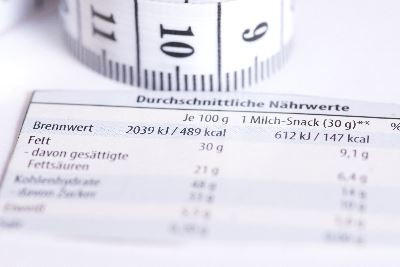 |  | ||||||||||||||||||||||||||||||||||||||||||||||||||||||||||||||||||||||||||||||||||||||||
Nutritional information | Ingredients | ||||||||||||||||||||||||||||||||||||||||||||||||||||||||||||||||||||||||||||||||||||||||
|
*Standard dissolution: 12.9 g HiPP 1 BIO + 90 ml water = 100 ml ready-to-drink food. 1 level measuring spoon = approx. 4.3 g HiPP 1 BIO |
Skim milk*, whey product*, vegetable oils* (palm oil❤, rapeseed oil*,sunflower oil*), lactose*, starch*, fish oil¹, potassium chloride, calcium carbonate, M. alpina oil, choline, sodium citrate, L-tyrosine, sodium selenite,L-tryptophan, calcium orthophosphates, zinc sulfate, ferrous sulfate, stabilizer * from organic production
Application
Important tips
|
Follow the instructions for use exactly when preparing infant milk formula. Improper preparation or storage of the prepared bottle over a longer period of time can lead to adverse health effects, e.g. due to the growth of undesirable germs. Therefore, prepare food freshly before each meal and feed immediately. Do not reuse leftover food. Clean bottle, teat and ring thoroughly. Re-seal the opened pouch tightly after product removal, store in a dry place at room temperature and use within 3 weeks. Do not heat the food in the microwave (risk of scalding).

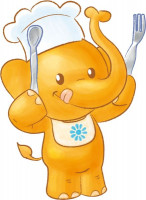
Drinking quantity per vial may vary from person to person. Recommended amounts and number of bottles per day are guidelines. Your baby does not necessarily have to drink the bottle empty. Please use only the enclosed measuring spoon! One measuring spoon corresponds to 30ml of water.
| Age | Bottle meal per day | Ready to drink food | boiled water | Measuring spoon |
| 1.-2. week* | 7-8 | 70 ml | 60 ml | 2 |
| 3.-4. week | 5-7 | 100 ml | 90 ml | 3 |
| 5.-8. week | 5-6 | 135 ml | 120 ml | 4 |
| 3.-4. month | 5 | 170 ml | 150 ml | 5 |
| 5. Month | 4-5 | 200 ml | 180 ml | 6 |
| from 6 month** | 4 | 235 ml | 210 ml | 7 |
* unless otherwise prescribed by the doctor
** From the 5th month, you can start with jars and porridges in consultation with the pediatrician. Babies need about 5 meals a day. With each newly introduced jar and porridge meal, one bottle meal should be omitted.
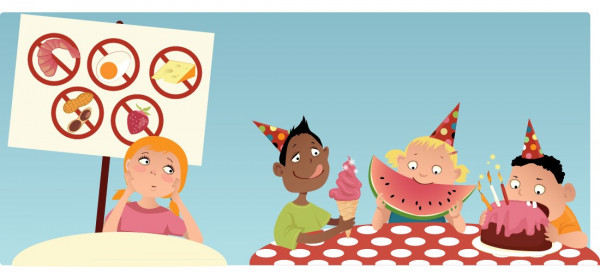
Find out here what is important for your baby's diet if he or she is at risk of allergies. Which initial food does it need if it cannot be breastfed and how and when to introduce complementary foods? Our guide will help you feed your baby the right way.
Even though we clearly mark changes in our products, we would like to advise you of the following: If your child has an allergy or food intolerance, we recommend that you always check the respective list of ingredients before using a food. Even if you use the product regularly.
With the new Food Information Regulation (LMIV) coming into force, the 14 most common food allergens must be highlighted in the list of ingredients from 13.12.2014 at the latest, e.g. by font, font style or underlining. HiPP is of course also implementing the new legal regulations as quickly as possible.
On some packaging you will also find the statement "may contain traces of ..." - usually in the visible field of the ingredients list. This is a voluntary indication by the manufacturer. This information means that despite careful manufacturing practices, it is sometimes impossible to avoid the inclusion of minute traces of allergenic substances in the product. The HiPP Baby Biscuit, for example, is manufactured without the addition of egg, sesame seeds or nuts. At the same time, however, nuts, sesame and egg are also processed at the production site. In this case, therefore, it cannot be 100 percent ruled out that minute traces of these ingredients may find their way into the HiPP Baby Biscuit.
In many cases, allergy sufferers show no reaction at all to possible traces of an allergen. However, the tolerance level above which allergic reactions occur is individual for each person. If you or your child react to even the smallest amounts with severe allergic symptoms, you should keep a close eye on the trace labeling.
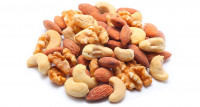 Unfortunately, many manufacturers use different terms for allergens. Sometimes they talk about nuts and/or seeds, sometimes about nuts. This sometimes causes confusion among consumers as to exactly which allergen is meant. In common parlance, hazelnuts, peanuts, almonds and the like are often referred to as nuts. Botanically speaking, however, only hazelnuts and walnuts are true nuts. So what is now counted as a nut?
Unfortunately, many manufacturers use different terms for allergens. Sometimes they talk about nuts and/or seeds, sometimes about nuts. This sometimes causes confusion among consumers as to exactly which allergen is meant. In common parlance, hazelnuts, peanuts, almonds and the like are often referred to as nuts. Botanically speaking, however, only hazelnuts and walnuts are true nuts. So what is now counted as a nut?
For this reason, we at HiPP have decided to use the term nuts in trace labeling in the future - in line with the legal requirements for allergen labeling. Nuts include: Almonds, hazelnuts, walnuts, cashews, pecans, Brazil nuts, pistachios and macadamia nuts. Traces of peanuts, which can often cause allergic reactions in even the smallest amounts, are still listed separately.
Important: Please always talk to your pediatrician or an allergist if you are unsure or you suspect your child is suffering from an allergy or intolerance. He or she can also help you with many questions about allergies.
At daab (Deutscher Allergie- und Astmabund e.V.) you can also obtain further information on this subject.
sehr schnelle und zuverlässige Lieferung mit UPS!
Ich bin zufrieden mit dem Produkt
